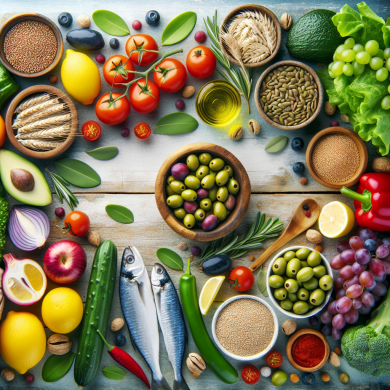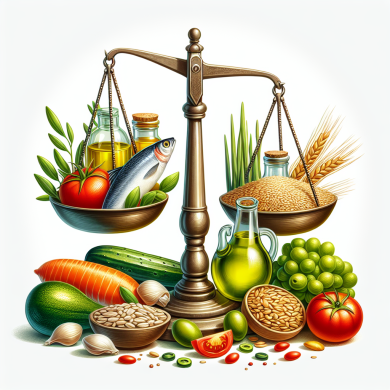Essential Foods for a Mediterranean Diet
Introduction to the Mediterranean Diet
The Mediterranean diet is more than just a way of eating; it’s a lifestyle that encompasses the culinary traditions and social habits of countries bordering the Mediterranean Sea. Celebrated for its numerous health benefits, this diet emphasizes the consumption of whole, minimally processed foods, rich in nutrients and flavor. Research has shown that the Mediterranean diet can reduce the risk of heart disease, stroke, and diabetes, while promoting longevity and overall well-being. This article explores the essential foods that form the backbone of the Mediterranean diet and how they contribute to a balanced, nutritious lifestyle.
Key Components of the Mediterranean Diet
The Mediterranean diet is characterized by an abundance of plant-based foods, healthy fats, and lean proteins. Below are the core food groups that are integral to this dietary pattern:
Fruits and Vegetables
A cornerstone of the Mediterranean diet is a high intake of fruits and vegetables. These foods are rich in vitamins, minerals, fiber, and antioxidants, all of which are crucial for maintaining good health.
– **Fruits**: Fresh fruits are consumed daily as snacks or desserts. Popular choices include apples, oranges, grapes, figs, and melons. These fruits provide natural sugars and essential nutrients, offering a healthy alternative to processed sweets.
– **Vegetables**: A wide variety of vegetables are consumed, often seasoned with herbs and olive oil. Staples include tomatoes, cucumbers, spinach, eggplant, and peppers. Leafy greens and root vegetables also feature prominently, contributing to the diet’s high fiber content.
Whole Grains
Whole grains are a primary source of energy in the Mediterranean diet. Unlike refined grains, whole grains retain their nutrient-rich bran and germ, offering more fiber, vitamins, and minerals.
– **Common grains**: Whole wheat bread, brown rice, bulgur, barley, and farro are commonly used. These grains are often included in salads, soups, and side dishes, providing a hearty base for many meals.
– **Pasta and couscous**: While pasta is a staple, it is typically consumed in smaller portions and often made from whole grains. Couscous, a North African grain dish, is also popular, paired with vegetables and proteins.
Legumes and Nuts
Legumes and nuts are excellent sources of plant-based protein, healthy fats, and fiber, making them vital components of the Mediterranean diet.
– **Legumes**: Beans, lentils, chickpeas, and peas are versatile and nutritious. They are used in various dishes such as stews, salads, and dips (like hummus), providing a substantial protein boost.
– **Nuts**: Almonds, walnuts, and pistachios are commonly consumed as snacks or added to dishes for texture and flavor. Nuts are rich in monounsaturated fats, which are beneficial for heart health.
Olive Oil
Olive oil is the primary source of fat in the Mediterranean diet, revered for its health-promoting properties. It is rich in monounsaturated fats and antioxidants, contributing to cardiovascular health.
– **Extra virgin olive oil**: This high-quality oil is used for cooking, dressing salads, and drizzling over dishes to enhance flavor. Its anti-inflammatory properties and high antioxidant content make it a key ingredient in this diet.
Seafood and Lean Proteins
While plant-based foods dominate the Mediterranean diet, seafood and lean proteins also play a crucial role, providing essential nutrients like omega-3 fatty acids and high-quality protein.
– **Seafood**: Fish such as salmon, sardines, and mackerel are staples, offering rich sources of omega-3 fatty acids, which support heart and brain health. Shellfish like shrimp and mussels are also enjoyed.
– **Poultry and eggs**: Chicken and turkey are consumed in moderation, providing lean protein. Eggs are a versatile ingredient, used in various dishes or enjoyed on their own.
Dairy
Dairy products are consumed in moderation, with a focus on quality and flavor.
– **Cheese and yogurt**: Cheese, particularly feta and halloumi, is enjoyed in small amounts, adding richness to salads and dishes. Yogurt, often plain and unsweetened, is a staple for breakfast or snacks, providing probiotics for gut health.
Herbs and Spices
Herbs and spices are used liberally in the Mediterranean diet, enhancing flavor without the need for excess salt or fat.
– **Common herbs and spices**: Basil, oregano, rosemary, thyme, and garlic are frequently used, offering both culinary and health benefits. These seasonings are rich in antioxidants and anti-inflammatory compounds.
The Health Benefits of a Mediterranean Diet
The Mediterranean diet is not only delicious but also packed with health benefits. Here’s how the essential foods contribute to a healthier lifestyle:
Heart Health
The emphasis on healthy fats, such as those found in olive oil and nuts, supports cardiovascular health by reducing bad cholesterol levels and increasing good cholesterol. The diet’s focus on fruits, vegetables, whole grains, and legumes provides fiber, which is crucial for maintaining healthy blood pressure and reducing the risk of heart disease.
Weight Management
The Mediterranean diet promotes weight management through its focus on whole, nutrient-dense foods that satisfy hunger and provide sustained energy. The high fiber content from fruits, vegetables, and whole grains aids in digestion and promotes a feeling of fullness, helping to prevent overeating.
Reduced Risk of Chronic Diseases
Research indicates that the Mediterranean diet can lower the risk of developing chronic diseases such as type 2 diabetes, certain cancers, and neurodegenerative diseases like Alzheimer’s. The diet’s rich antioxidant content helps combat oxidative stress, a contributing factor to these conditions.
Improved Mental Health
Emerging studies suggest a link between the Mediterranean diet and improved mental health outcomes. The diet’s anti-inflammatory properties and omega-3 fatty acid content may play a role in reducing the risk of depression and cognitive decline.
Incorporating the Mediterranean Diet into Your Lifestyle
Adopting a Mediterranean diet is more about making lifestyle changes than following strict rules. Here are some practical tips for incorporating this diet into your daily routine:
Start with Small Changes
Begin by gradually replacing processed foods with whole, unprocessed alternatives. Swap refined grains for whole grains, choose fresh fruits and vegetables, and cook with olive oil instead of butter or margarine.
Focus on Plant-Based Meals
Plan meals around plant-based foods, using meat as a complement rather than the main focus. Incorporate legumes, whole grains, and vegetables into your meals for variety and nutrition.
Enjoy Meals with Others
The Mediterranean diet emphasizes the social aspect of eating. Share meals with family and friends, savoring the flavors and enjoying the experience. This mindful approach to eating can enhance satisfaction and promote healthier eating habits.
Explore New Recipes
Experiment with Mediterranean recipes to discover new flavors and cooking techniques. Try dishes like Greek salads, vegetable stews, or grilled fish with herbs and lemon. Cooking at home allows you to control ingredients and portion sizes, ensuring a healthier meal.
Stay Active
Physical activity is an integral part of the Mediterranean lifestyle. Engage in regular exercise, such as walking, cycling, or swimming, to complement your healthy eating habits and enhance overall well-being.
Conclusion
The Mediterranean diet offers a delicious and sustainable approach to eating that emphasizes whole, nutrient-rich foods. By focusing on fruits, vegetables, whole grains, healthy fats, and lean proteins, this diet promotes health and longevity. Whether you’re looking to improve heart health, manage weight, or reduce the risk of chronic diseases, the Mediterranean diet provides a balanced, flavorful, and enjoyable way to nourish your body and enhance your quality of life. Embrace the Mediterranean lifestyle and experience the myriad benefits it has to offer.















Add comment